Key takeaways:
- Resilience in business involves adapting to challenges and fostering strong relationships to navigate setbacks effectively.
- Resilient marketing requires understanding audience shifts, experimenting with strategies, and maintaining transparent communication to build trust.
- Customer loyalty is cultivated through genuine connections, personalization, and community engagement, enhancing brand advocacy.
- Collaboration within the industry and actively listening to customer feedback are crucial for product innovation and sustained growth.
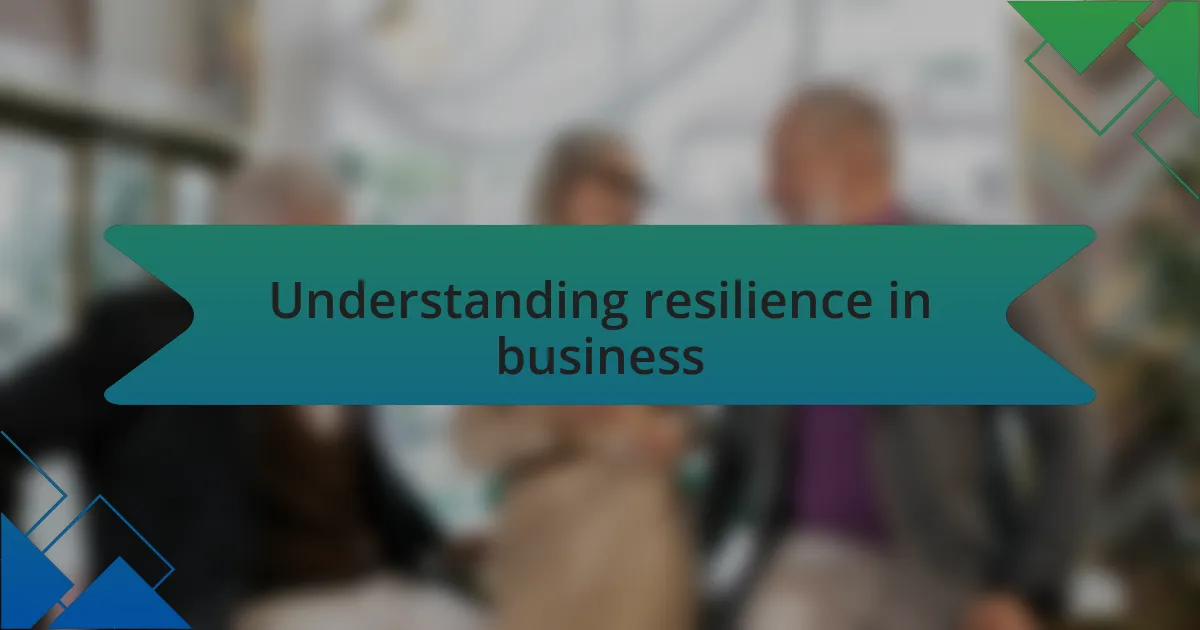
Understanding resilience in business
Resilience in business is about more than just bouncing back from setbacks; it’s about the capacity to evolve and adapt in the face of challenges. I remember a time when our sales took a sharp decline due to a sudden market shift. Instead of panicking, we went back to the drawing board, re-evaluated our strategies, and sought creative ways to connect with our customer base. Have you ever found yourself at a similar crossroads, wondering how to turn a setback into an opportunity?
Building resilience requires a mindset that embraces change. I often reflect on how my perspective shifted during difficult periods—I learned to view obstacles not just as roadblocks but as valuable lessons. This mindset allowed me to innovate and strengthen my business’s foundation. How do you perceive the challenges in your business journey? Each hurdle can teach us something invaluable if we’re open to learning.
At its core, resilience also involves fostering strong relationships—both within your team and with your customers. I’ve seen firsthand how supportive teamwork can create a buffer during tough times. When the chips are down, do you have a network to lean on? Building these connections can be the difference between weathering a storm and emerging stronger on the other side.
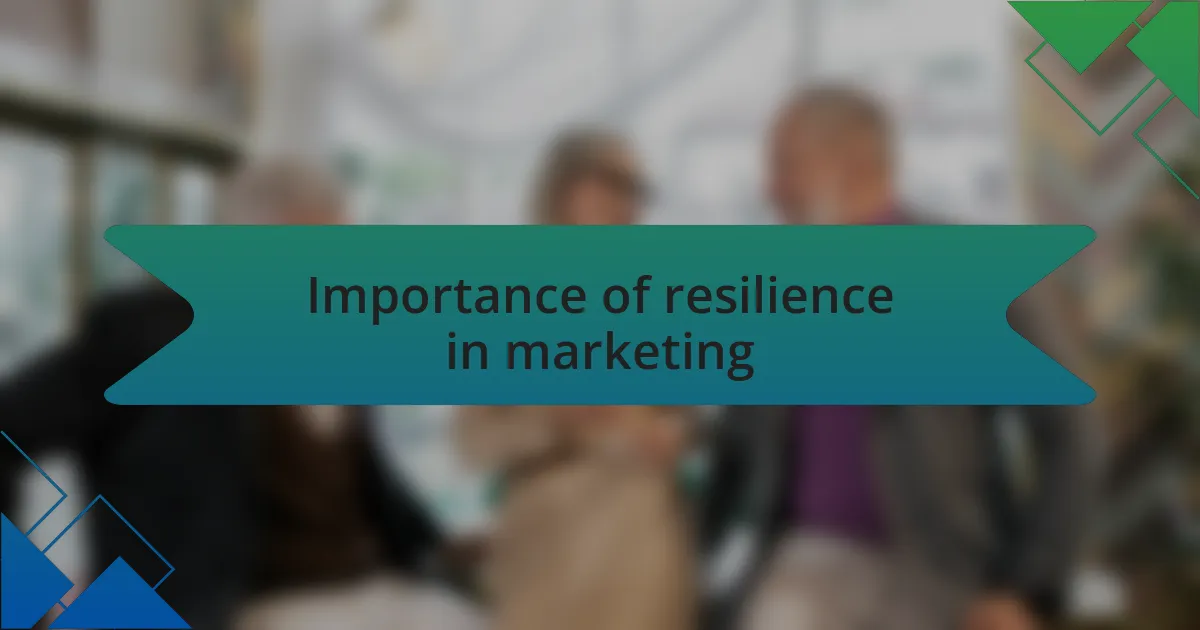
Importance of resilience in marketing
Resilience in marketing is essential because it equips businesses to understand their audience better amidst changing circumstances. I recall a time when a trend shifted dramatically, leaving some brands struggling to keep up. In that moment, I realized that being adaptable allowed us to refine our messaging and even discover new customer segments we hadn’t considered before. Have you ever found a marketing breakthrough after a setback?
Moreover, resilient marketing strategies are often rooted in experimentation and learning from failure. I embraced trial and error, which meant running campaigns that didn’t always hit the mark. Each failure taught me something valuable about my market and customer preferences. Isn’t it fascinating how a misstep can lead to greater insight?
Additionally, a resilient marketing approach emphasizes the importance of consistent communication. I’ve learned that maintaining transparency with customers, especially during uncertain times, helps build trust. Have you experienced how honest dialogue can strengthen your relationships? It’s incredible to see how openness can aid both brand reputation and customer loyalty, even when things get tough.
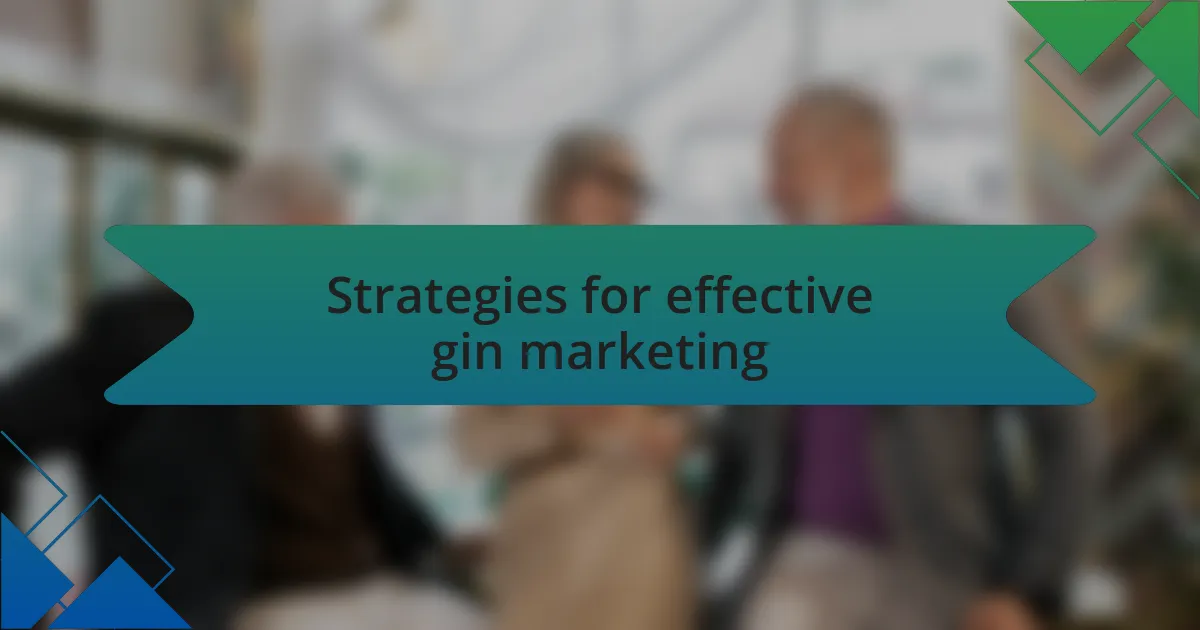
Strategies for effective gin marketing
When it comes to gin marketing, creating impactful storytelling can be a game changer. I remember crafting a campaign that highlighted the heritage of our gin, tying it to local botanicals and the community’s traditions. It was a simple idea, but it resonated deeply with our audience, sparking conversations and emotional connections. Have you ever found that your brand’s story has the power to transform perceptions?
Equally important, leveraging social media platforms effectively can amplify your message. I experimented with Instagram, showcasing not just our gin but the lifestyle that comes with it. Engaging content, like cocktail recipes and behind-the-scenes glimpses, made followers feel like they were part of our brand’s journey. It’s amazing how visuals can create an inviting atmosphere that invites interaction; have you thought about how your visuals generate engagement?
Finally, building partnerships with other local businesses can provide a strategic edge. I teamed up with a local distillery for a unique tasting event, blending our strengths and expanding our reach. Collaborations like this not only enhance brand visibility but foster a supportive community spirit. How often do you consider the power of partnerships in your marketing strategy? It’s a tangible way to share resources and cultivate a loyal customer base.

Adapting to market changes
Adapting to market changes is crucial for survival in the dynamic world of gin marketing. I recall a time when consumer tastes shifted rapidly towards craft distilleries, pushing us to reassess our offerings. It was a wake-up call that taught me the importance of being attuned to industry trends; have you ever felt that urgency to pivot when the market changes?
To effectively respond to these shifts, we initiated a series of focus groups with our loyal customers. Their insights on flavor preferences and packaging helped us innovate our products to better align with their expectations. Engaging directly with your audience can provide invaluable feedback; have you ever considered the power of listening to your customers as a strategy?
Moreover, I invested time in market research to identify emerging trends and competitors’ strategies. One key finding was the growing demand for sustainable practices, prompting us to adopt eco-friendly packaging. This not only appealed to our customers but also aligned with my values, making the adaptation feel meaningful. How often do you explore new opportunities that align with your brand’s mission?
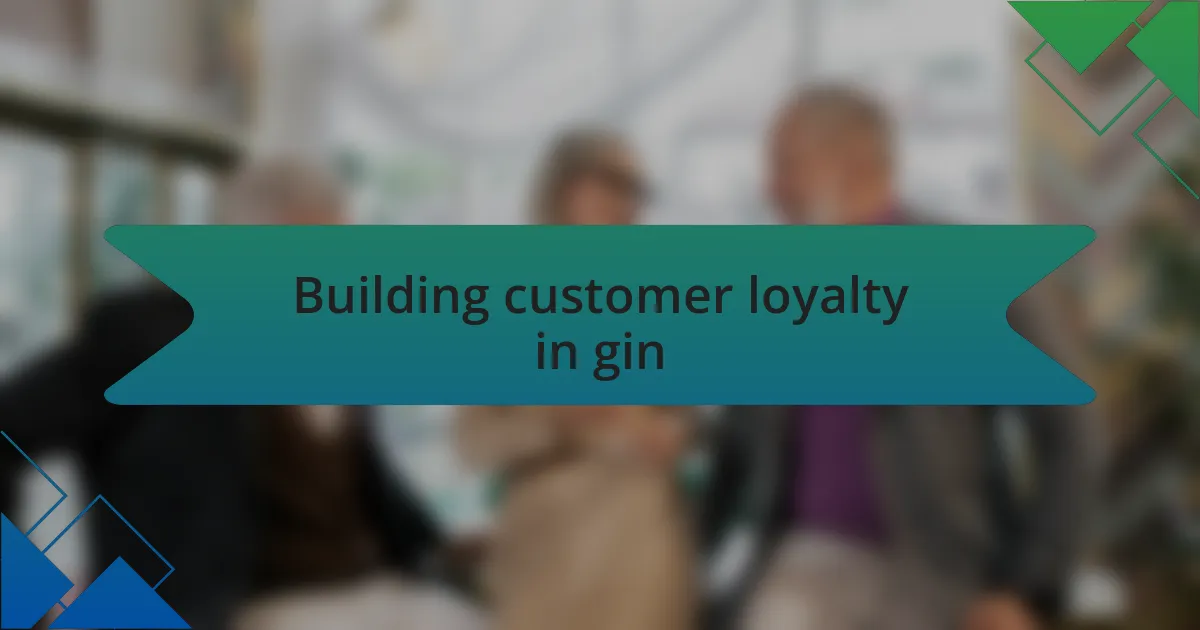
Building customer loyalty in gin
Building customer loyalty in the gin sector requires a genuine connection with your audience. I remember hosting a tasting event at a local bar where our regulars got to sample limited-edition flavors. The excitement on their faces as they discovered new favorites was palpable, reinforcing that these moments of engagement really matter. How often do you create opportunities for your customers to feel personally invested in your brand?
Personalization also plays a pivotal role in cultivating loyalty. I started sending handwritten thank-you notes to our repeat customers, expressing my gratitude for their support. This small gesture made a big difference; I’ve had customers reach out just to share how much it meant to them. Isn’t it fascinating how such a simple act can deepen the relationship with your audience?
Furthermore, leveraging social media to create a sense of community has been a game-changer. I initiated a monthly contest where followers could share their cocktail creations using our gin, with the chance to win exclusive merchandise. This not only encouraged interaction but also fostered a sense of belonging among customers, turning them into brand ambassadors. Can you imagine the loyalty you could build by empowering your customers to showcase their creativity?
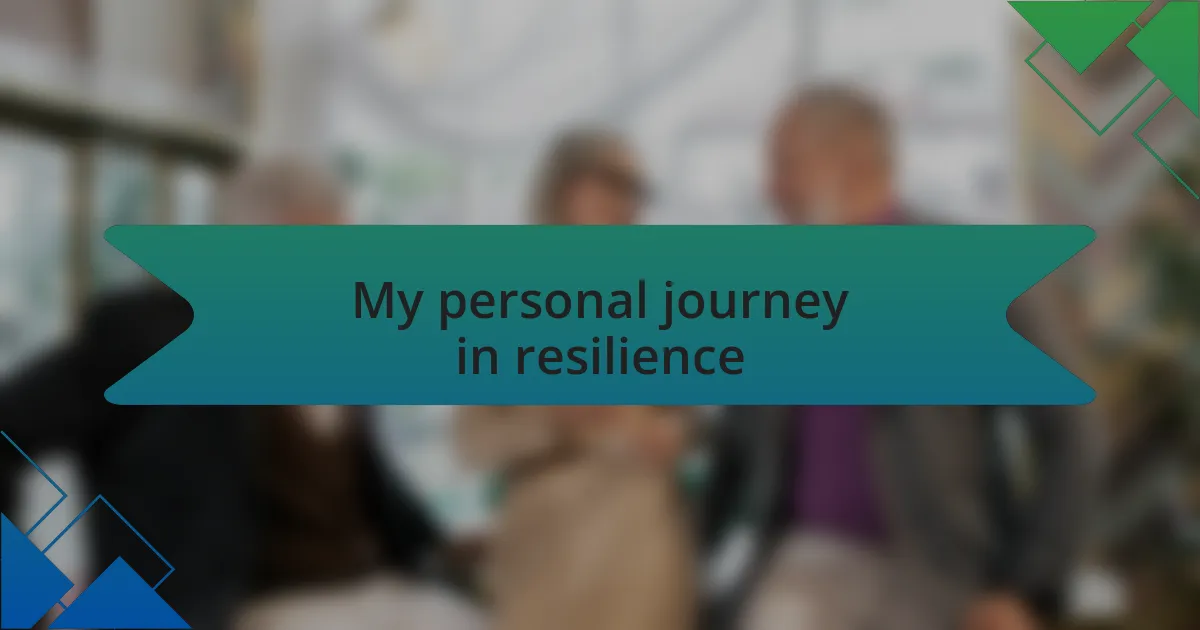
My personal journey in resilience
Resilience in my business journey often feels like a continuous test of character. When we faced an unexpected supply chain disruption, I found myself deep in problem-solving mode, exploring alternative suppliers late into the night. That experience taught me the importance of agility—how quickly can you pivot when adversity strikes?
There was a particularly challenging moment when I nearly lost a crucial partnership. I reached out directly to the partner, laying my cards on the table and sharing my fears and hopes. The vulnerability sparked a renewed commitment on both sides, reminding me that honest communication builds resilience. Have you ever found that authenticity can turn a dire situation into an opportunity for growth?
I also found resilience in community connections. During a difficult financial quarter, I organized a local gin festival to rally support from fellow businesses. The response was overwhelmingly positive, as we not only attracted customers but also strengthened our local network. How could a shared challenge, like tough economic times, transform into a powerful collective response?
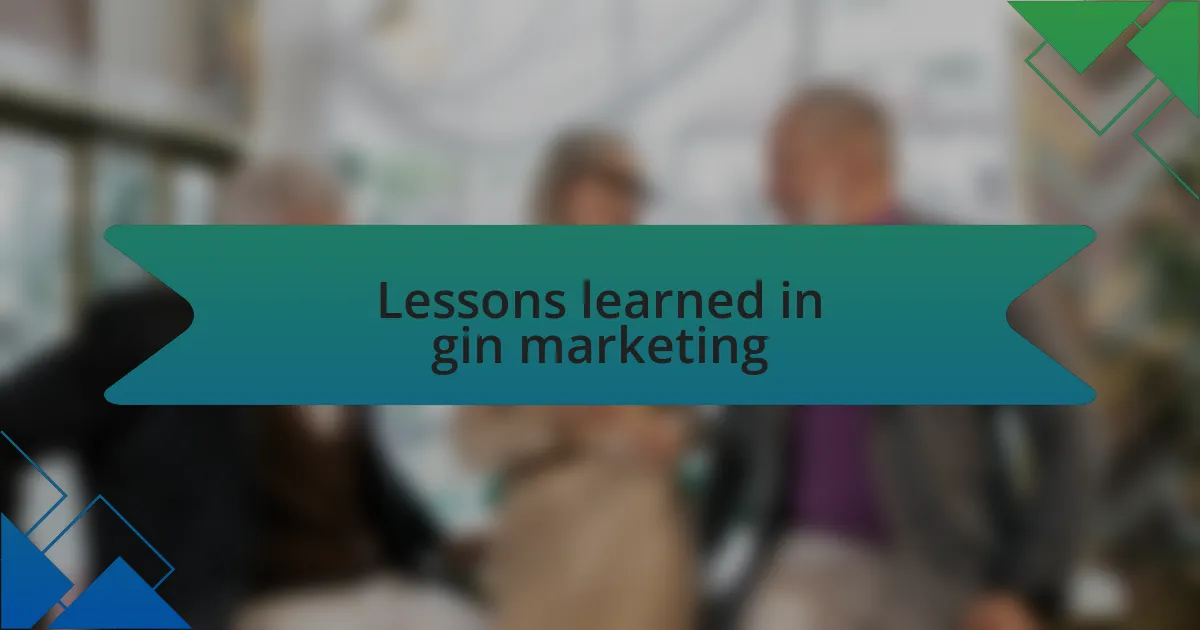
Lessons learned in gin marketing
When I first dipped my toes into gin marketing, I underestimated the power of storytelling. One campaign centered around the origins of our gin’s botanicals turned out to be a game-changer. Customers responded not just to the product but to the narrative, reminding me that compelling stories can create an emotional connection that mere facts cannot. Have you ever found that a simple story can resonate more deeply than the most polished sales pitch?
I’ve also learned that collaboration is key in the gin community. Partnering with local distillers for unique blends not only diversified our offerings but also fostered a sense of camaraderie. This experience reinforced my belief that, especially in niche markets, collaboration can open doors that competition would typically close. Isn’t it interesting how working together can enhance creativity and innovation?
Finally, I came to appreciate the significance of customer feedback. Early on, I organized tasting events that allowed consumers to share their thoughts directly. Their insights often guided our product development, making them feel like part of our brand journey. This lesson taught me that actively listening to customers can transform their feedback into valuable strategies for growth. How often do we overlook the voices of those who truly matter in our business?